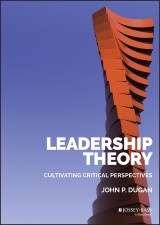Details
Leadership Theory
Cultivating Critical Perspectives1. Aufl.
|
60,99 € |
|
| Verlag: | Wiley |
| Format: | EPUB |
| Veröffentl.: | 30.01.2017 |
| ISBN/EAN: | 9781118864227 |
| Sprache: | englisch |
| Anzahl Seiten: | 416 |
DRM-geschütztes eBook, Sie benötigen z.B. Adobe Digital Editions und eine Adobe ID zum Lesen.
Beschreibungen
<b>An interdisciplinary survey text on leadership theory grounded using critical perspectives</b> <p><i>Leadership Theory</i> is designed specifically for use in undergraduate or graduate classrooms providing a comprehensive overview of essential theories informing the leadership studies knowledgebase. The text infuses critical perspectives in a developmental manner that guides readers through increasingly complex ways in which theory can be deconstructed and reconstructed to enhance practice and advance social justice. The book uses compelling examples, critically reflective questions, and multiple approaches to concept illustration to cultivate readers' abilities to engage as critical learners. At the heart of this are powerful counter-narratives offering a range of insights on the challenges and rewards of leadership. Narratives represent accomplished leaders from across a broad range of fields including Eboo Patel, Mary Morten, Felice Gorordo, and more. The facilitator's guide and instructor's website supplement this with case studies, sample syllabi, structured dialogues, and learning activities tied to each chapter. <p>Leadership texts tend to limit application of theory to a singular disciplinary context, omit important ways in which research evolves the understanding of theory, and/or lack critical evaluation of theories which diminishes the ability to translate theory to practice. This book provides a much-needed solution to these issues. <ul> <li>Learn the nature, origin, and evolution of specific theories</li> <li>Understand and apply leadership theories using critical perspectives</li> <li>Consider the influences of ethics and justice, social location, and globalization</li> </ul> <p>The rapid expansion of leadership programs has thrown the dearth of suitable primary texts into sharp relief. Instructors forced to cobble together course materials from multiple piecemeal sources will find their much-needed solution in <i>Leadership Theory</i>.
<p>List of Tables and Figures xi</p> <p>Preface xv</p> <p>Acknowledgments xxv</p> <p>About the Author xxix</p> <p><b>1. The Evolving Nature of Leadership 1</b></p> <p>Why Study Leaders and Leadership? 2</p> <p>What Is Leadership? 3</p> <p>Mapping the Definitional Terrain 4</p> <p>Chapter Summary 23</p> <p><b>2. Critical Perspectives as Interpretative Frameworks 29</b></p> <p>Letting Go of Theoretical Certainty 30</p> <p>What Is Critical Social Theory? 31</p> <p>Central Themes of Critical Social Theory 33</p> <p>Using Critical Perspectives as Interpretative Tools 42</p> <p>Essential Preparation for Applying Critical Perspectives 49</p> <p>Benefits of Using Critical Perspectives 52</p> <p><b>3. Interpreting Leadership Theory Using Critical Perspectives 57</b></p> <p>Critical Social Theory and Leadership 57</p> <p>Evolution of Formal Leadership Theory 58</p> <p>Implicit Leadership Theory 72</p> <p>Chapter Summary 82</p> <p><b>4. Person-Centered Theories 85</b></p> <p>Trait-Based Leadership 85</p> <p>The Leadership Challenge Model 90</p> <p>Emotionally Intelligent Leadership 94</p> <p>Strengths-Based Leadership 98</p> <p>Deconstruction of Person-Centered Theories 104</p> <p>Reconstruction of Person-Centered Theories 109</p> <p>Chapter Summary 113</p> <p><b>5. Theories of Production and Effectiveness 117</b></p> <p>Style Theory 117</p> <p>Situational Leadership 125</p> <p>Path-Goal Theory 132</p> <p>Deconstruction of Theories of Production and Effectiveness 138</p> <p>Reconstruction of Theories of Production and Effectiveness 143</p> <p>Chapter Summary 147</p> <p><b>6. Group-Centered Theories 151</b></p> <p>Leader-Member Exchange Theory 151</p> <p>Team Leadership 160</p> <p>Shared Leadership 169</p> <p>Deconstruction of Group-Centered Theories 176</p> <p>Reconstruction of Group-Centered Theories 180</p> <p>Chapter Summary 185</p> <p><b>7. Theories of Transformation 189</b></p> <p>Transforming/Transformational Leadership 189</p> <p>Servant Leadership 197</p> <p>The Social Change Model of Leadership Development 206</p> <p>Deconstruction Theories of Transformation 215</p> <p>Reconstruction Theories of Transformation 219</p> <p>Chapter Summary 222</p> <p><b>8. Relationship-Centered Theories 227</b></p> <p>Connective Leadership 228</p> <p>The Relational Leadership Model 236</p> <p>Relational Leadership Philosophies 241</p> <p>Deconstruction of Relationship-Centered Theories 249</p> <p>Reconstruction of Relationship-Centered Theories 252</p> <p>Chapter Summary 254</p> <p><b>9. Vanguard Theories 257</b></p> <p>Authentic Leadership 257</p> <p>Adaptive Leadership 265</p> <p>Complexity Leadership Theory 276</p> <p>Deconstruction of Vanguard Theories 283</p> <p>Reconstruction of Vanguard Theories 289</p> <p>Chapter Summary 292</p> <p><b>10. Toward a Justice-Based Leadership Model 297</b></p> <p>Strategic Social Change Leadership 298</p> <p>Deconstruction and Reconstruction of Strategic Social Change Leadership 306</p> <p>Chapter Summary 307</p> <p><b>11. Integration and the Path Forward 313</b></p> <p>Emergent Themes Across Leadership Theories 314</p> <p>The Interconnection of Leadership Theory and Development 322</p> <p>Closing Thoughts 327</p> <p>References 331</p> <p>Name Index 361</p> <p>Subject Index 371</p>
<p><b>JOHN P. DUGAN</b> is an associate professor in the higher education graduate program at Loyola University Chicago, where he teaches student development theory, leadership, and multiculturalism for social justice. He is the principal investigator for the Multi-Institutional Study of Leadership, and the co-editor of <i>The Handbook for Student Leadership Development, Second Edition</i> (Jossey-Bass, 2011)<i>.</i>
<p><b>LEADERSHIP THEORY AND PRACTICE GROUNDED IN CRITICAL PERSPECTIVES</b> <p>"This book breathes new life into leadership studies. Every student of leadership<b>—</b>novice or veteran<b>—</b>will benefit from exploring the implications of Dugan's developmental and critical approach. While calling attention to hidden social realities in leadership discourse <b>—</b>like inequality and injustice<b>—</b>Dugan invites a hopeful reframing of leadership theory and practice and challenges readers to recognize their own capacity to transform the world."<br/> <b>—Sonia M. Ospina,</b> professor, R.F. Wagner Graduate School of Public Service, New York University <p>"John Dugan provides a valuable addition to the leadership literature by introducing perspectives derived from critical social theory as a means to engage readers as critical learners. This is a novel approach to teaching leadership and one that readers will appreciate."<br/> <b>—David V. Day,</b> director, Kravis Leadership Institute, Claremont McKenna College <p>"What a fantastic book<b>—</b>I could not put it down! This critical review of the strengths and weaknesses of the best known leadership theories fundamentally enhances our understanding. Its insights are transformative. Dugan offers ways to improve these theories rather than disregarding them based on their shortcomings. I love the notion of zombie theories<b>—</b>you have to read the book to find out what that is! The narratives help ground complex concepts and the reflection questions compel the reader to struggle with the material."<br/> <b>—Adrianna Kezar,</b> professor for higher education, University of Southern California



















